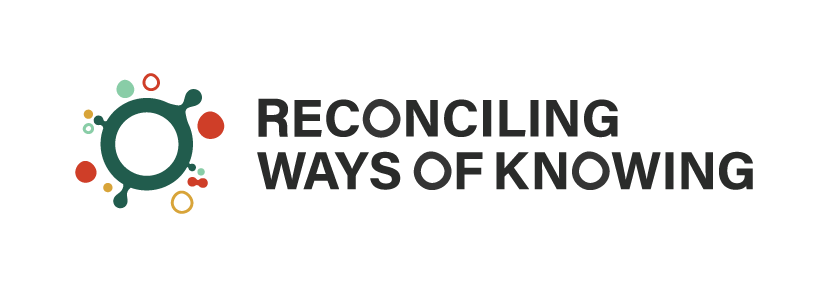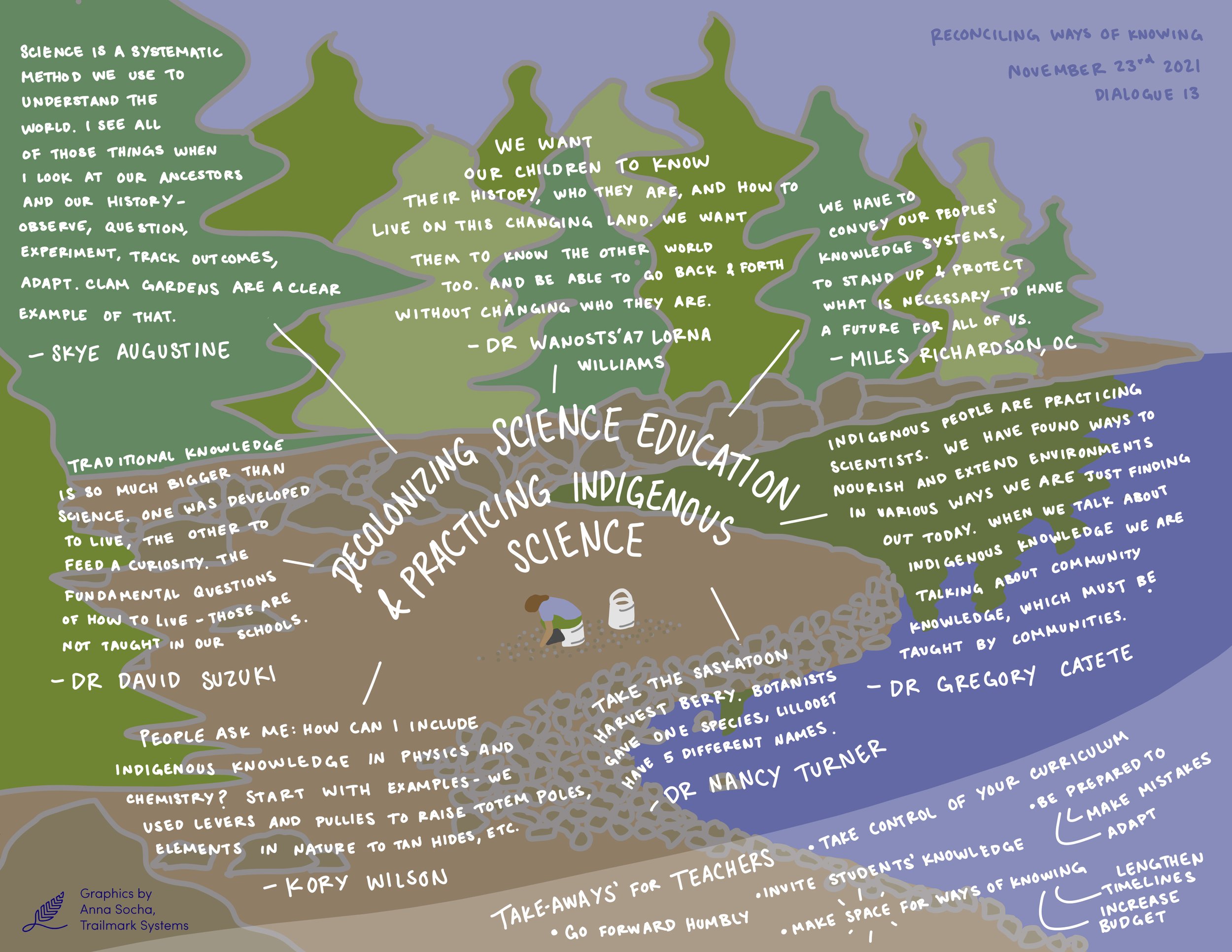Decolonizing Science Education & Practicing Indigenous Science: Dialogue 13
This dialogue took place on November 23, 2021.
Throughout our dialogues, one of the most consistent themes that has come up through the reflections of the speakers and our convenors, and through the questions and feedback of participants, is the importance of decolonizing science education and practicing ethical and culturally responsive and appropriate research. For this dialogue, we brought together a panel of leading Indigenous researchers and practitioners dedicated to transforming science education and the practice of science and research.
Moderator Kory Wilson (Indigenous education researcher; We Wai Kai First Nation, Kwakwaka’wakw Nation) facilitated a conversation between Dr. Lorna Wanosts’a7 Williams (Indigenous and science education researcher; Lil’wat Nation), Dr. Gregory Cajete (Indigenous science and education researcher; Tewa, Santa Clara Pueblo), and Skye Augustine (marine restoration scientist; Stz’uminus Nation, Hul’q’umi’num’) on the nature of the need for change, good work underway, and future avenues for change that educators, researchers, practitioners, and many others can help bring about in their work and lives. Read the panellists bios below.
This dialogue speaks to the growing call for and recognition of the need to decolonize education and research, including in fields of science, to reduce barriers and make space for Indigenous people undertaking the study and practice of science; to develop respect for Indigenous knowledge within science education; to foster scientific research and practice that works in ethical partnership Indigenous Peoples; to bring the innovations and wise practices of evolving, ancestral Indigenous knowledge/science together with mainstream science to restore resilient ecosystems and societies.
Speaker biographies
Kory Wilson
Kory Wilson (Kwakwaka’wakw), BSc., JD is the Executive Director of Indigenous Initiatives and Partnerships for British Columbia Institute of Technology. She is the Chair of the National Indigenous Education Committee of Colleges and Institutions Canada and Chair of the World Federation of Colleges and Polytechnics Indigenous Affinity Group.
Kory has over 20 years of experience in post-secondary education, community development, and legal profession. She serves on many boards from Pearson College, BC Women’s Foundation, Downie Wenjack Fund, Future Skills Canada, to the BC First Nations Justice Council. She is currently also Co-Chair, Diversity and Inclusion Leadership Council, Greater Vancouver Board of Trade.
Kory is a sought-after speaker and strategist on advancing and ‘truth-telling’ about the past and moving forward towards Reconciliation. With a deep commitment to education, both formal and informal, she knows innovative and creative solutions are a must to move Reconciliation into ReconciliACTION. Education and access to knowledge are key to move everyone forward. When people know better, they do better.
Dr. Lorna Wanosts’a7 Williams
Dr. Lorna Wánosts’a7 Williams is Professor Emerita of Indigenous Education, Curriculum and Instruction at the University of Victoria and Canada Research Chair in Education and Linguistics. She built her career on the principle that quality education for Indigenous children must be characterized by strong cultural teachings alongside a Euro-Western education.
Together with Gloria Snively, Wanosts’a7 edited the two-volume Knowing Home: Braiding Indigenous Science with Western Science (Victoria, University of Victoria, 2016).
She currently serves as the Elder/member of the Ministers Advisory Council on Indigenous Women, Member of the Indigenous Circle for SSHRC and chair of First Peoples Cultural Foundation. She was inducted into the Order of BC in 1993; the Order of Canada in 2020, Officer in 2019; Indspire Award 2017 all for her work in Indigenous Education and languages.
Dr. Gregory Cajete
Gregory Cajete, Ph.D. (Santa Clara Pueblo), is a Native American educator whose work is dedicated to honoring the foundations of Indigenous knowledge in education. Dr. Cajete is a Tewa Indian from Santa Clara Pueblo, New Mexico, and is a Professor of Native American Studies and Language, Literacy and Sociocultural Studies at the University of New Mexico.
He worked at the Institute of American Indian Arts in Santa Fe, New Mexico for 21 years. While at the Institute, he served as Dean of the Center for Research and Cultural Exchange, Chair of Native American Studies and Professor of ethno science. He organized and directed the First and Second Annual National Native American Very Special Arts Festival held, respectively, in Santa Fe, NM, in 1991 and Albuquerque, NM, in 1992. In 1995, he was offered a position in American Indian education in the University of New Mexico, College of Education. He has served as a New Mexico Humanities scholar in ethnobotany of Northern New Mexico and as a member of the New Mexico Arts Commission.
Dr. Cajete designs culturally-responsive curricula geared to the special needs and learning styles of Native American students. These curricula are based upon Native American understanding of the “nature of nature’ and utilizes this foundation to develop an understanding of the science and artistic thought process as expressed in Indigenous perspectives of the natural world.
Dr. Cajete has authored five books: Look to the Mountain: An Ecology of Indigenous Education (1994); Ignite the Sparkle: An Indigenous Science Education Curriculum Model (1999); Spirit of the Game: Indigenous Wellsprings (2004); A People’s Ecology: Explorations in Sustainable Living (1999); and Native Science: Natural Laws of Interdependence (2000).
Skye Augustine
Skye Augustine is from the Stz’uminus Nation and is a Hul’q’umi’num’ scholar, marine scientist, and mentor whose leadership supports people to reconnect with ancestral lands, waters and ways of knowing. She is a doctoral candidate with the Coastal Marine Ecology & Conservation Lab at Simon Fraser University.
Recently, she led a 6-year clam garden restoration project in the Southern Gulf Islands – a collaboration between Hul’q’umi’num’ and SENĆOŦEN speaking knowledge holders, scientists and resource managers. This landscape-scale restoration experiment examines the impacts of revitalized clam garden practices on intertidal ecosystems and linked human communities by drawing on Indigenous knowledge and marine ecology.
Skye is passionate about supporting Indigenous peoples to reclaim connections with their ancestral territories and foster resilient humans and landscapes during times of rapid change.
––
DR. DAVID SUZUKI
Dr. David Suzuki is a father, grandfather, environmental activist, and an award-winning geneticist and broadcaster, known particularly for his roles in the CBC Radio show Quirks and Quarks and CBC Television’s The Nature of Things. He is widely recognized as a world leader in sustainable ecology and has received numerous awards for his work, including a UNESCO prize for science and a United Nations Environment Program medal. Along with his partner, Tara Cullis, Miles Richardson, and others, he helped co-found the David Suzuki Foundation in 1990. For his support of Canada’s Indigenous peoples, Suzuki has been honoured with eight names and formal adoption by two First Nations.
Dr. Suzuki is Professor Emeritus in Zoology at the University of British Columbia, after serving on faculty for 32 years. He has authored and co-authored more than 50 books, nearly 20 of which have been written for children. He has received several Gemini Awards for his work in Canadian television, the Order of British Columbia and Order of Canada, as well as numerous honorary degrees. He received a lifetime achievement award from the University of British Columbia in 2000 and the Right Livelihood Award (known as the “Alternative Nobel Prize”) in 2009.
DR. NANCY TURNER
Dr. Nancy Turner is an ethnobotanist whose research integrates the fields of botany and ecology with anthropology, geography and linguistics, amongst others. She is interested in the traditional knowledge systems and traditional land and resource management systems of Indigenous Peoples, particularly in western Canada. She has worked with Indigenous Elders and cultural specialists in northwestern North America for over 40 years, collaborating with Indigenous communities to help document, retain and promote their traditional knowledge of plants and habitats, including Indigenous foods, materials and medicines, as well as language and vocabulary relating to plants and environments. Her interests also include the roles of plants and animals in narratives, ceremonies, language and belief systems.
Emeritus Professor in the School of Environmental Studies at the University of Victoria, Dr. Turner was awarded a Pierre Elliot Trudeau Fellowship in 2015, in support of discussion amongst multiple informed groups on the roles of ethnobotany and ethnoecology in policy, planning and decision-making in the legal and governance arenas around Indigenous Peoples’ land rights and title. She Turner has authored, co-authored or co-edited over 20 books and over 150 book chapters and peer-reviewed papers, and numerous other publications, both popular and academic.
MILES RICHARDSON, O.C.
Miles G. Richardson, O.C., is a citizen of the Haida Nation and an Officer of the Order of Canada. Early in his career, while serving as Administrator for the Skidegate Band Council, he directed the establishment of the Haida Gwaii Watchmen program. Then, while serving as the youngest President of the Council of the Haida Nation (1984-1996), he led the drafting of the Constitution of the Haida Nation; development of the first comprehensive Haida Nation land and marine use plan, enacted under Haida law; and negotiation of the Gwaii Haanas Agreement, the first Nation-to-Nation agreement between the Haida Nation and Canada, which protected the Gwaii Haanas area of his people’s homeland, Haida Gwaii. He was a member of the BC Claims Task Force recommending negotiations to build a new relationship. He served as a delegate of the First Nations Summit Task Group (1991-1993) and was subsequently nominated by the Summit and appointed as a Commissioner to the BC Treaty Commission for two terms. He served as Chief Commissioner of the BC Treaty Commission (1998-2004).

